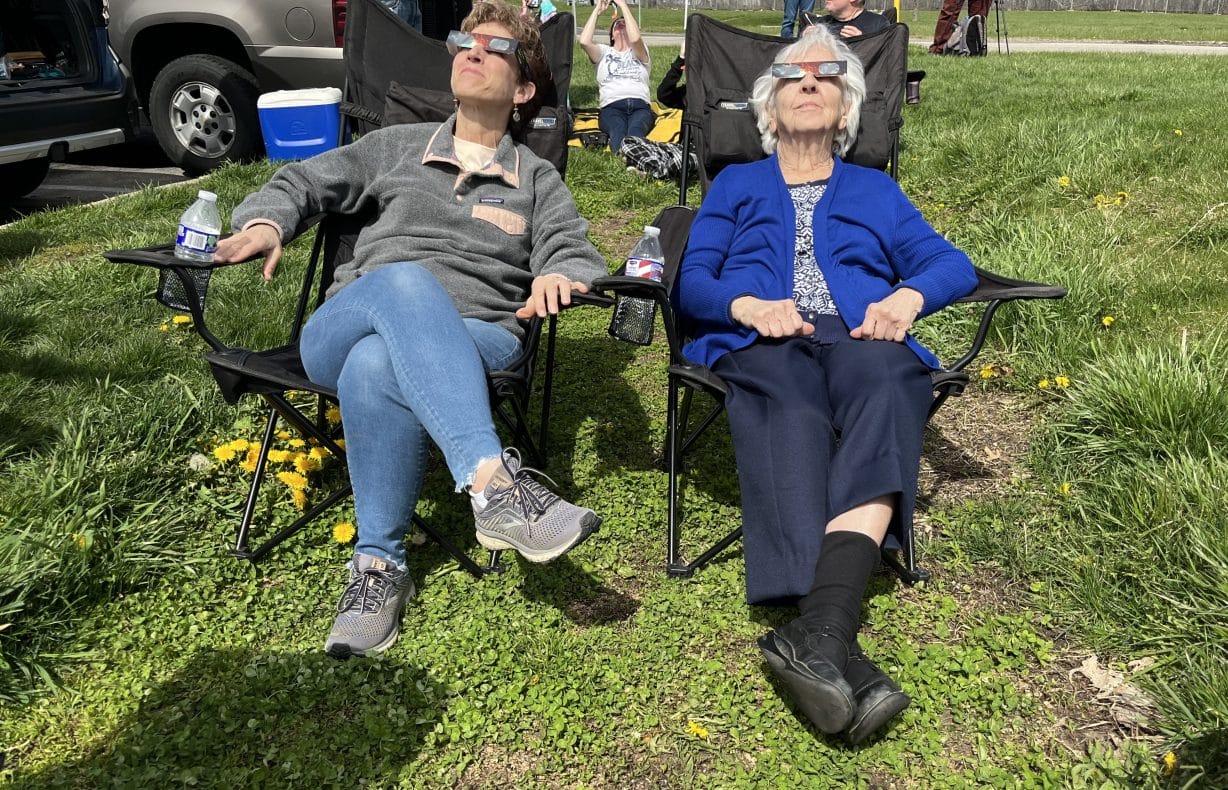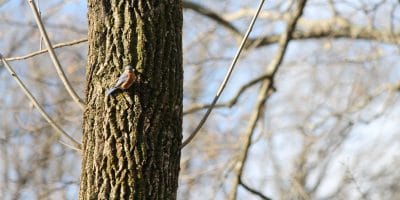
By Mary Ann Zehr
It was no small miracle that seven people in my family–ages 8 to 91–and I viewed the total eclipse together from the same spot on a grassy bank at a service plaza of the Ohio turnpike on April 8. The four minutes of collective awe we experienced while viewing an uncommon celestial ring of light affirms that we can be joyful as a family. That means that other families like ours who have tended to be on the serious side for a very long time can do the same. Joy can break through.
My father, Floyd Zehr, a longtime physics professor who passed away nearly a decade ago, instilled in my three siblings and me a curiosity about the heavens. Dad had taught an astronomy course and had chased a total eclipse once before with my mom, Pearl, and my brother, Kenton. We now know that Dad erred in that he picked a viewing spot that wasn’t quite in the path of totality. This was in 1984 and he didn’t have GPS to help him.
A colleague was right when he noted, after I told him that I planned to drive from Harrisonburg to western Pennsylvania to view the total eclipse, that I belong to a “nerdy family.” Most of my family members–and here I mean my mom, siblings and their partners, and nieces and nephews and their partners–are big readers or like to learn about and see new stuff.
We’ve always been nerdy, but our family culture has evolved particularly in the last decade to be more democratic, more tolerant of each other’s ways of being and doing, and more able to have fun (i.e. we exercised our fun muscles a few years ago by bowling at my niece’s wedding reception!)
An increasingly democratic family culture means if we are planning an eclipse-gazing event, we don’t tell each other to leave such and such a place at such and such a time and meet up at such and such a location at a particular time. We just wait for people to show up.
So on the day of the eclipse, my sister Bonnie, Mom, and I left my brother’s house in my hometown of New Wilmington, Pa., around 9:30 am to find a service plaza along the Ohio turnpike that would be in the path of totality and have clear skies for viewing the eclipse around 3 pm. My sister had listened to weather reports and declared “Erie is out” because of the likelihood of cloudiness. She and I speculated that the service plazas could be closed by police after parking lots were full and that systems might get overwhelmed by crowds and our cell phones might not work.
As we were leaving the house, the rest of our family members were just getting up or having breakfast. My brother was skeptical that service plazas would be filled or that traffic would be a problem. He had no interest in staking out a viewing spot so early in the day. We had no interest in cramping his style or anyone else’s style.
We don’t see each other very often, so we hugged each other good-bye in case we wouldn’t be able to meet up.

But it turned out that the service plaza in Amherst, Ohio, where Mom, Bonnie, and I found a place to park and a grassy viewing spot did not close, our cell phones worked, and though my 30-something nephew, Dylan, and his partner needed to stop to charge their Tesla rental on the way to the eclipse-gazing spot, by 2:35 pm, we were all peering up at the sun together with flimsy glasses perched on our noses. Our viewing location was about 100 miles west of my hometown.
We suggested to the second-grader among us that she should think about what she would report to her teacher about the eclipse because she had missed school for the day. The teacher had thought the adventure would be “cool.”
“I wonder what the ancients thought,” my brother said as the round black moon progressed little by little to block the sun. He remarked that he had left a transparent rock at home that the ancients might have looked through to safely see an eclipse.
My nephew suggested that the Biblical account of Joshua stopping the sun could have been a total eclipse.
We knew we weren’t witnessing the end of the world, but something about the uncommon phenomenon of an eclipse felt apocalyptic.
My brother paraphrased lyrics from a song, “I Never Cared for You,” by Willie Nelson that say, “The sun is filled with ice and gives no warmth at all.”
I recalled the poem “Fire and Ice,” by Robert Frost, about the end of the world and we quoted some of its lines: “Some say the world will end in fire, Some say in ice. . .”
“How many say this is worth it?” my sister called out and our hands shot up in the air. It had taken some effort to get here. We had traveled from not only Harrisonburg, but from Detroit, the District of Columbia, and Lancaster, Pa.
When the moon blocked most of the sunlight, our surroundings took on a metallic hue and we felt a pleasant coolness. Lights in the parking lot of the service plaza automatically turned on.
I watched through glasses as the light of the sun became a speck and then for a moment the sky was only black. But then suddenly a brilliant ring of light popped into the sky as a ring of sunlight glowed around the edges of the moon.
My brother clapped. People murmured excitedly around us.
It was safe to take off our glasses and look directly at the sun’s corona.

“Oh my goodness,” “Oh my word,” “Fantastic,” “It’s so beautiful,” we exclaimed.
My nephew pointed out that the ring of light had a curious red dot.
“I can’t believe the red dot,” my sister said.
And then suddenly we saw what looked like a 360-degree sunrise.
“Help me up,” my mother called emphatically, and my sister pulled her up out of her camp chair as we stood and marveled at the ring of light that stayed in the sky for four minutes. We scanned the horizon in every direction to view the sunset-like orange and yellow streaks that glowed in the sky.
Then, before we were emotionally ready to let it go, the ring of light disappeared and the eclipse reverted to being a sliver of dull orange light showing behind the dark sphere of the moon.
“Bring it back!,” I exclaimed.
My brother and nephew wondered how fast we would have to fly in order to keep the ring of light in view for much longer than those precious four minutes.
“Dad would have loved it,” I said.
“We started out doing it for him and then we did it for ourselves,” my sister said. “We took time out of our day to rest.”
Mom said that it was “special” we had all found the same viewing spot. She recognized that in a family, moments of unity and joy deserve appreciation and respect.
Mary Ann Zehr is a composition and rhetoric instructor at Eastern Mennonite University and the co-author of a memoir, Doors Cracked Open: Teaching in a Chinese Closed City, published by Resource Publications, an imprint of Wipf and Stock, in 2024.
Thanks for reading The Citizen, which won the Virginia Press Association’s 2022 News Sweepstakes award as the top online news site in Virginia. We’re independent. We’re local. We pay our contributors, and the money you give goes directly to the reporting. No overhead. No printing costs. Just facts, stories and context. We value your support.













